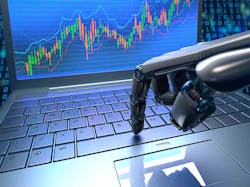In this weird age of personal technology, customized service, and individual profiling, something seemed oddly out of order: While politicians, entertainers, and other social worthies behave like crazy neighbors, battling siblings, and obnoxious in-laws, the financial community has exhibited all the reliability and generosity of a favorite uncle. The expansion of the U.S. and global economies during 2017 was explainable in various ways —tax and regulatory relief for businesses, incentivized investors, more confident consumers — and all of them true in their way, but only if you were looking for a clear justification of good results. Otherwise, the improving economy was just a light diversion from some scandal or disaster happening elsewhere.
Until this month. The financial markets set off a bit of panic early in February, just a hint of the anxiety and desperation that many of us recall from about a decade ago, but enough to make me wonder if I had missed something during 2017.
Back in 2008, one could see the disaster unfold. Questionable schemes and dodgy risk structures had become more or less standard in some precincts, and their crash seemed somehow inevitable. That’s what happens to liars. And when the giants came down they brought with them the overextended and undercapitalized enterprises they had used to distribute their risk — banks, manufacturers, retailers and other seemingly permanent fixtures of the commercial landscape, to say nothing of the unrealized wealth of so many of us. That part was hurtful.
The 2008 crisis was dire, but not unknown. There had been shades of it in 1987 and 1997, and the “market meltdown” we saw in early February seems to have been quite mild even by those precedents. It was sudden though, inasmuch as the typical indicators (commodity prices, inflation, wages) did not suggest that global equity markets would lose about $5 trillion of book value over one week.
I have a building sense, however, that “suddenness” is the defining characteristic of our time, and that if we’re going to understand the business cycles that influence our behavior we ought to adapt ourselves to this feature.
We seem to appreciate suddenness in many other ways: news flashes, pricing windows, status updates. The algorithmically defined communication and data processing networks we willingly submit to are typically accepted as an advantage to consumers seeking a good deal or some uniquely elusive product. We call them Smart.
The business world is enamored of Smart technologies that monitor processes and catalog data points, issue alerts and initiate resolutions. Such systems maximize the value of inputs, elevate the value of finished products, and optimize the capital and operating expenses. There is indeed something Smart about such technologies.
But technologies that adjust your thermostat or record your favorite show, are not your friend. They do not work this way as a favor. They do what they are told, and in the case of financial markets they are instructed to project risks and avoid losses. No one can say with certainty that automated trading platforms are the cause of the February reversal, but it is generally believed that algorithmic trading accelerated the sell-off that spread from the U.S. to other markets and lingered for six trading days, and a smart approach would be to recognize what these systems do, and how.
This weird age pays homage to technology and glorifies rationality. At the same time, there is a widespread fascination with the peculiar and excessive behaviors of individuals, and an altogether toxic reliance on personal impulses and emotions as proof or justification for poor choices and bad behavior. If we assign the best human qualities to inanimate devices and systems, the error is in our understanding of ourselves, and the irrationality is in our response to the outcomes we don’t like.
About the Author
Robert Brooks
Editor/Content Director - Endeavor Business Media
Robert Brooks has been a business-to-business reporter, writer, editor, and columnist for more than 20 years, specializing in the primary metal and basic manufacturing industries. His work has covered a wide range of topics including process technology, resource development, material selection, product design, workforce development, and industrial market strategies, among others.
Currently, he specializes in subjects related to metal component and product design, development, and manufacturing—including castings, forgings, machined parts, and fabrications.
Brooks is a graduate of Kenyon College (B.A. English, Political Science) and Emory University (M.A. English.)

